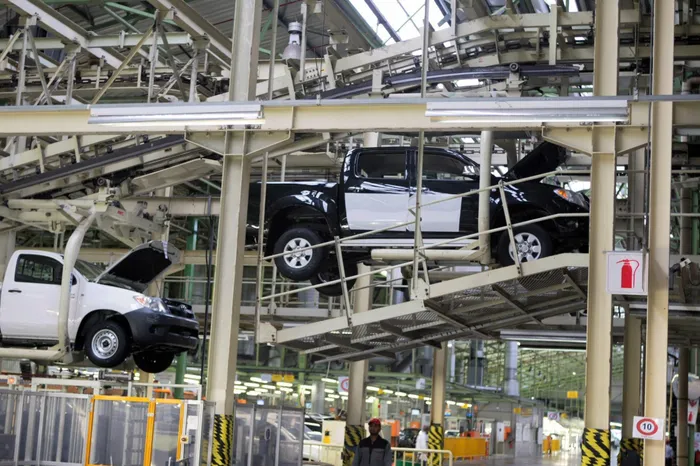Manufacturing picks up by full reopening of SA economy

The return of production at Toyota’s flood-affected factory helped support demand across the value chain. Photo: Simphiwe Mbokazi
However, South Africa’s ongoing energy crisis and the slowing global economic activity could threaten to dent this momentum in manufacturing output later in the year.
The seasonally adjusted Absa Purchasing Managers’ Index (PMI) gained 4.5 points in August, ticking up to 52.1 points from 47.6 in July amid an easing in the intensity of load shedding and declining fuel prices.
The more favourable reading was supported by a pick-up in business activity, which rose back above the neutral 50-point mark for the first time since March.
Business activity had been hampered for months following the flooding in KwaZulu-Natal and significant electricity supply disruptions.
Load shedding escalated to Stage 6 during June and July in response to Eskom workers’ industrial action at several power plants, weighing heavily on the energy intensive manufacturing sector.
Absa said that new sales orders continued to decline in August, but at a slower rate than before.
The purchasing price index declined for a second consecutive month and is now at the lowest level since mid-2021, meaning that the rate of increase in costs was slowing, not that those prices were declining.
Absa said the steep fall in the fuel price at the start of August had likely helped with alleviating overall cost pressures, with a further notable decline in the fuel price expected next week.
Absa Corporate and Investment Banking macro-economist Miyelani Maluleke said that domestic demand was likely continuing to benefit from the reopening effect since the termination of the National State of Disaster.
Maluleke said some respondents also mentioned the return of production at Toyota’s flood-affected factory as supporting demand across the value chain.
“The amount of load shedding we had in August was not that much compared to the previous months. The other thing that was encouraging was on the cost side, we are starting to see manufacturers saying that the cost pressures they experienced over the last 12 to 18 months are starting to come down a little bit,” Maluleke said.
“Looking ahead, we are still concerned by the electricity supply situation as Eskom said in Parliament yesterday that the likelihood of more waves of load shedding remains high, but at the same time we are seeing global economic activity slowing down, and that is going to affect the domestic performance of the manufacturing sector.”
At the same time, the latest global PMI data suggests that external demand was weakening. Indeed, the SA PMI export sales indicator was stuck in negative terrain for a second month.
But the expected business conditions index saw an encouraging improvement, reflecting optimism from purchasing managers that cost pressures will continue to abate over the next six months.
Investec economist Lara Hodes said manufacturing activity had been boosted by the reforms in the energy sector which gave private sector participation and boosted confidence.
“A decline in load shedding and the announcement by the president outlining measures directed at fundamentally transforming the electricity sector and positioning it for future sustainability, likely assisted in boosting sentiment,” Hodes said.
BUSINESS REPORT